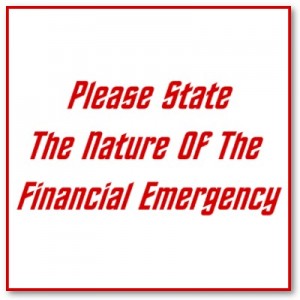(ThyBlackMan.com) Preparing for financial emergencies is a wise move. Financial experts advice everyone to set aside enough funds that is enough to last for at least six months. Thus, in case of a loss of job or unexpected circumstances, you are assured that you have savings for you and your family until you find a new job or a new source of income.
Is it really possible to save money with your paycheck? How can you get  over the challenge of saving up for the future? Here are some tips to help you secure yourself for a financial emergency:
over the challenge of saving up for the future? Here are some tips to help you secure yourself for a financial emergency:
Open a checking account. Opening a checking account enables you to send your paycheck or part of your paycheck directly to your deposit account. This is great as it prevents you from spending your cash on unnecessary expenses. It also guarantees that you won’t forget to set aside something for your savings.
Take out a personal loan from a credit union. When you need extra cash for emergencies, turn to a credit union for help instead of payday loan lenders. Compared to banks, credit unions have a more lenient policy and lower rates for borrowers.
Seek credit counseling. There are credit counseling agencies accredited by the government that offers counseling services for a cheap cost. If you have trouble controlling your spending or handling your credit cards and finances, it’s best to seek help than to let yourself get stuck in uncontrolled debts.
Watch your spending. The best way to save your money even with a limited paycheck is to control your spending. To start with, make a list of all your monthly expenses and subtract it from your monthly salary. It may be necessary for you to make adjustments on your expenses to stretch your budget. This would require self-discipline on your part to avoid unnecessary splurges and luxuries.
Apply for insurance. Personal insurance policies, home insurance, and car insurance policies protect you from financial emergencies. Medical bills alone can put you in debt in just a few weeks if you don’t have a health insurance to cover you. It’s best to set aside a portion of your monthly salary for your insurance payments as part of your financial plan.
Take out a Home Equity Loan. A home equity loan is another source of emergency funding that you can avail on emergencies. However, be aware that a home equity loan puts your property at great risk. If you fail to keep up with your payments, you risk losing your home in the end. Thus, it is very important to carefully consider all your options first and to set-up your repayment plan if you intend to use your home equity for a loan.
Written By Liz Roberts




















Leave a Reply